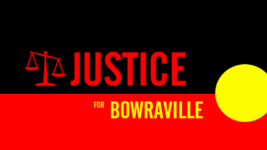Justice for Bowraville: Calls to Review NSW Double Jeopardy Laws

Three Aboriginal children from the NSW mid-North Coast town of Bowraville were murdered over a five month period beginning in September 1990. And while police claim there is now enough evidence to establish the guilt of the alleged killer, the laws against double jeopardy are preventing him from standing trial.
The issue is the suspect, an Anglo-Australian man who cannot be publicly named, has already been acquitted for two of the murders. And NSW double jeopardy laws stop prosecutors for trying him again for the same crimes, despite retrials being permissible when “fresh and compelling evidence” is available.
On the 22nd of this month, a three justice panel of the High Court refused to grant special leave to the state attorney general to appeal a decision made by the NSW Court of Criminal Appeal last September that the evidence was not “fresh”.
Although the High Court is the final court of appeal, the families of the victims have vowed to continue their fight, as they maintain that if the evidence surrounding all three murders was heard together, the suspect would be convicted.
NSW Greens MLC David Shoebridge has tirelessly campaigned for the victims’ families. Mr Shoebridge proposes to introduce an amendment bill when parliament resumes, with a view to changing the laws regarding “fresh” and “inadmissible” evidence, so that cases like this can be retried in the future.
Ongoing colonial injustice
“We’re now coming into the fourth generation of family members who have seen the criminal justice system fail them,” Mr Shoebridge told Sydney Criminal Lawyers. “What we’re seeing is a deep wound that keeps being torn open every time the criminal justice system refuses them justice.”
The NSW Greens justice spokesperson posited that if the victims had been white kids from Sydney’s North Shore, the injustice wouldn’t be continuing 30 years on. He explained that police initially showed little concern for the murders, and that the first investigations were carried out by child care workers.
“This isn’t a failing of any three High Court judges or any three Court of Criminal Appeal judges this is a comprehensive failing of the criminal justice system when it comes to First Nations peoples,” Shoebridge made clear. He added that this is nothing new, it’s been going on for 230 years.
The murdered children
The three slain children lived on Cemetery Road in the Aboriginal Housing Estate at Bowraville known as “The Mission”. They all disappeared following local parties attended by the suspect, a local labourer, who was well known amongst the First Nations community.
Colleen Walker disappeared on the 13 September 1990. The 16-year-old’s body has never been found. Police subsequently located her clothing weighed down by rocks in a river. And there are allegations the man was hassling her at the party that night and had touched her a few months prior.
Evelyn Greenup was only 4-years-old when she went missing from her grandmother’s home on 3 October 1990. Evidence was heard that the man was seen looking through a window of the house that evening. Her remains were found in April 1991. She’d suffered trauma to her head.
Clinton Speedy disappeared in the early hours of 1 February 1991. He and his girlfriend had been drinking at the man’s caravan that night. She woke up to find her boyfriend gone and her underwear removed. The 16-year-old boy’s body was found on 18 February, with two injuries to his skull.
The acquittals
The white man, who is now in his early 50s, was charged with Clinton’s murder on 8 April 1991. On 16 October whilst out on bail, he was charged with the murder of Evelyn. Significantly, the murders were tried separately even though they share many similarities.
The man was acquitted of Clinton’s murder in February 1994, following a sketchy prosecution case. This led to the prosecution for the murder of Evelyn being dropped. Her case was reopened in 2004. And when the man finally stood trial for her murder, he was again acquitted in March 2006.
Double jeopardy in NSW
It is a long-standing legal principle that a person should not be tried more than once over the same alleged criminal conduct.
Known as the double jeopardy rule, it seeks to prevent the unfairness of the state – with all its resources – having more than one attempt at convicting a person.
It is an important legal safeguard, providing accused persons with some degree of certainty regarding their legal situation and allowing them to get on with their lives after they have gone through the trauma of criminal proceedings and all that’s associated with it.
In the absence of the rule, the state could theoretically have as many ‘bites of the cherry’ as it wished, perhaps ultimately getting lucky and securing a conviction.
It also seeks to ensure the state does not prosecute until it is confident there is enough evidence to do so.
Previous amendments
In 2006, an amendment bill was passed in NSW parliament that altered the double jeopardy provisions contained in the Crimes (Appeal and Review) Act 2001 (the Act), so that retrials can take place for certain types of offences, when there’s significant new evidence.
Section 101 was inserted into the Act, which provides that for crimes that carry a maximum penalty of life imprisonment an acquitted person can be brought to retrial if “there is fresh and compelling evidence”.
Section 102 stipulates that evidence is “fresh” if it was not tendered in earlier proceedings and could not have been. While “compelling” evidence is that which is “reliable”, “substantial”, “highly probable” and “would have been inadmissible” in the earlier proceedings.
The Greens amendment bill
Then Detective Inspector Gary Jubelin explained in 2016, as an application for re-trial was submitted, that if the man stood a single trial for all three murders with the new evidence relating to the death of Colleen Walker, he would likely be found guilty.
“The entire dispute in the Bowraville case has been what it means to be fresh evidence,” Mr Shoebridge explained. “Whether or not evidence that was available, but could not be admitted in evidence, can become fresh because the laws of evidence have changed.”
The amendment bill that the Greens MLC will now be re-introducing to parliament inserts subsection 2A into section 102 of the Act, so that evidence is fresh if it “was inadmissible” in the earlier proceedings, but “as a result of a substantive legislative change” it would now be admissible.
“Our amendment bill would make it clear that evidence can be fresh evidence if it was available, but inadmissible at the time of an earlier trial, which is the precise circumstances in the Bowraville matter,” Shoebridge continued.
A new chance for retrial
Mr Shoebridge added that the Greens legislation in its present state also opens up a gateway so that a second application for a Bowraville murders retrial can be made. He praised now Detective Chief Inspector Jubelin and his team on “having done everything they could to deliver justice”.
So, now it’s also up to the wider community to rally around this issue to ensure that NSW parliamentarians see the importance of amending the double jeopardy laws for the relatives of the Bowraville victims who yet again witnessed the justice system fail them last Friday.
“As First Nations people, they’ve seen it happen to their parents and their grandparents and their great grandparents as far back as they can remember,” Mr Shoebridge concluded. “And I will join with them to do what we can to correct those historic wrongs.”








